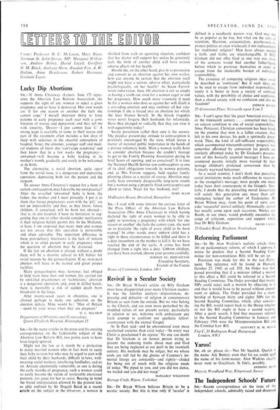SIR,—I can't agree that 'the great American revivalists of the
nineteenth century . . . converted men from an outcast condition to one of social responsibility.' Since Pentecost, Christian conversion has been based on the premise that man is a fallen creature, that, left to his own devices, his path is spiritually down- ward. Thus, the kind of self-sufficient respectability which accompanied nineteenth-century 'progress' was somewhat affronted by conversion (as people are similarly affronted today by Dr Graham's presenta- tion of this basically essential message). I have en- countered parents initially more worried by their teenage children's professed conversion than by formerly wayward behaviour.
As a social scientist, I don't think that prevailing social institutions make much difference to reactions to the evangelist's message; most people one meets today have their counterparts in the Gospels. Simi- larly, I doubt that the prevailing moral laissez-faire will satisfy this generation any more than self- indulgence helped the author of Ecclesiastes. Dr Brjran Wilson may, from his point of view, con- sider 'successful' revival unlikely. Historically, revival has usually come upon such occasions. Wesley and Booth, in our times, would probably encounter the range of criticism, opposition and support which














































 Previous page
Previous page